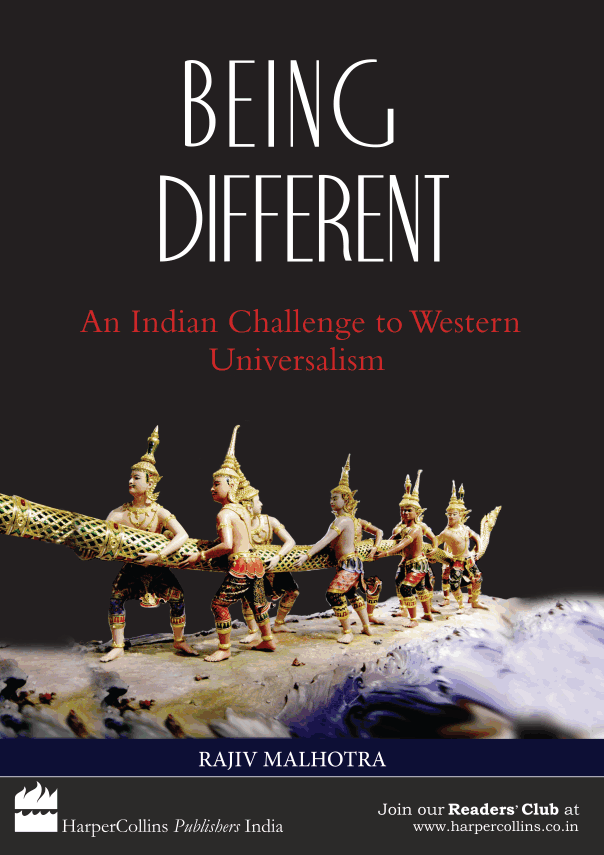[This is an example of an attempt at digesting Shiva into Christianity (Jesus). An abbreviated version of this blog was first posted in the Rajiv Malhotra Forum]
(link source: http://beingdifferentbook.com)
The Samudra Manthana story in Hinduism (pictured in book cover, above) appears to be a key metaphor to describe order & chaos in the book 'Being Different: An Indian Challenge to Western Universalism" (BD), where the Amrit (nectar) that comes out of the churning the ocean represents 'order', and the accompanying poison, the 'chaos and disorder'. In multiple online forums, Shiva's drinking of the poison is equated to Christ's crucifixion to proactively save humanity from original sin. Some Hindus have equated Shiva's act as one of collective salvation from sin, feeding the myth of sameness. (see here, here, and here). A key truth-claim of Hinduism is the cause-and-then-effect concept of Karma, so Shiva cannot bear anybody else's "sins". We all have to follow our own Sva-Dharma and shape our own destiny across multiple births. Hindus do not have to (and can't) depend on a "single-life + third-party salvation model" like Christianity. (Read BD & the earlier blog posts on history-centric model of Abrahamic Faiths). Reading Chapter 4 of BD again (I quote from the Amazon-Kindle copy), indicates that this interpretation is incorrect.
1. Firstly, BD notes:
"....The story of the Samudra-manthana is not intended to be taken literally.
Indeed, the ultimate uncertainty of knowing how the universe came about is given
eloquent expression in the famous 'Hymn of Creation' ..."
whereas History-Centric Christianity requires Crucifixion, resurrection & its
implications of collective salvation to be literally and absolutely true, with
no room for alternative explanations.
2. BD also rules out equivalence to a story in the 'book of revelation' where
'satanic disorder' has to be absolutely vanquished:
"...In one such story, Lord Shiva himself consumes the fierce, dark and bitter
poison first churned up from the ocean. He does so in order to overcome it,
leaving the nectar to others. But significantly, Shiva makes this choice both
out of knowledge (of the poison's deadly effect) and love (for those who might
suffer harm) – not out of any dark, destructive passion. Furthermore, he is able
to transmute the poison not by ejecting it but by incorporating it in himself.
An equivalent story in the Book of Revelation, conceivably, might be for Christ,
in his second coming, to assimilate the Devil rather than defeat him in an
external struggle. Thus Christ would be setting a constructive example as
opposed to demanding that all humans join him in a war against all those who
side with the Devil. But, needless to say, this is but a hypothetical scenario;
the good versus evil dualism of Judaism and Christianity is absolute."
3. The section below appears to give the interpretation of 'why Shiva drank the
poison':
"... Disorder serves as a source of creativity by preventing order from becoming
fossilized. The Lord is not only the creator of the universe (as Brahma) and the
maintainer of its order (as Vishnu) but also the one who ultimately dissolves it
(as Shiva). The dissolution makes room for the next cycle of creation. At the
spiritual level, Shiva, the Lord of Yoga, aptly assumes the appearance of chaos
to facilitate the dissolution of bondage to the falsehoods in our minds – making
way for new creation..."
(picture link source: http://bhavanajagat.com/tag/bhagavata-purana-prahlada-charitra/)

